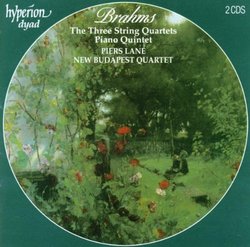| All Artists: Johannes Brahms, New Budapest String Quartet, Piers Lane Title: Brahms: The Three String Quartets; Piano Quintet Members Wishing: 0 Total Copies: 0 Label: Hyperion UK Release Date: 9/9/1997 Album Type: Import Genre: Classical Styles: Chamber Music, Historical Periods, Modern, 20th, & 21st Century Number of Discs: 2 SwapaCD Credits: 2 UPC: 034571120188 |
Search - Johannes Brahms, New Budapest String Quartet, Piers Lane :: Brahms: The Three String Quartets; Piano Quintet
 | Johannes Brahms, New Budapest String Quartet, Piers Lane Brahms: The Three String Quartets; Piano Quintet Genre: Classical
|
Larger Image |
CD DetailsSimilar CDs
|
CD ReviewsPassionate and Well-recorded Performances JMB1014 | USA | 09/17/2004 (5 out of 5 stars) "The New Budapest quartet is not widely recorded - yet. This set, the first I had heard of theirs, made we want to hear more. As others have noted, the sound is excellent, warm and rich. It enhances the passionate intensity and intelligence of these performances. I had previously been familiar with the original Budapest's recordings on LP; the sound on these is much better. (I will not venture to compare the performances, since the original Budapest is simply in a class by itself.) These thoughtful interpretations reward repeated listening; I get some new insight or perspective each time I listen to one. The op. 67 almost sounded like a new piece when I heard it on this set. The third movment, mentioned in another review, is indeed different for Brahms, though I found it temperamentally reminiscent of another third movement, namely, the one in his third symphony. It is exquisitely rendered here. I cannot bear the piano quintet too often because of its emotional power. My other favorite recording is of the Guarneri with Rubinstein. This version lacks nothing. It brims with rich, articulate musicianship. Even the price is welcoming. After hearing the Brahms, I searched out other recordings by this excellent and disciplined ensemble. I have been happy with their recordings of Borodin chamber music, d'Indy (the piano quintet is truly outstanding and features the same pianist) and the complete Beethoven quartets. The New Budapest preserves certain old school qualities in a modern context - in some respects they are the opposite of the Emerson Quartet, though both groups are technically accomplished. I find the New Budapest's recordings very rewarding and a pleasure to recommend. I look forward to hearing more from them." It doesn't get better than these performances ! Jeffrey Lee | Asheville area, NC USA | 10/15/2003 (5 out of 5 stars) "Rather than simply editing my previous inadequate commentary on these CDs (given quite a while ago), I think it's better, especially after more extended listening, that I return to them and offer, separately, a more thorough and informative review...Though the two string quartets are brothers of a sort, I find them to be two horses of a different color. The C minor No. 1 is more appealing to me. It has greater depth, and a very beautiful, poignant second movement romanze with a touch of sadness. Its first movement displays a masterful combination of diverse melodic elements--confident, bold musical strokes, mysterious tones, passion and moments of pleasant, flowing tunefulness. Though the third movement partially contains an element of tragedy, its theme and variations produce some of the most exquisite instrumental color changes I have heard. The final movement returns to the sense of drive characteristic of the opening movement. While the A minor, No.2 Quartet has its moments, e.g., a rich, flowing first movement with an intermittent melody reminiscent of the flavor of Brahms' Hungarian Dances, it can get to be a bit tiring, as it does in the second movement. Nonetheless, the New Budapest's quality of play throughout both works is exceptional. The opus 67 Quartet reflects immediately its more cheerful major key mode. Though marked vivace, there are moments when cascading melodies are interspersed occasionally with slower moving, more serious tones. The sweet sounding andante is sporadically and faintly reminiscent of Mozart. The group gives it fluent expression. There's a winsome, almost exotic style that marks the third movement. In some ways, it is unlike anything I have ever heard before in Brahms' music. Very nice. At the onset of the last movement, I smile at the pleasant, seemingly Haydnesque refrain, which Brahms proceeds to develop through variation. A most enjoyable piece, superbly articulated by the performers. The Piano Quintet in F minor is one of those truly masterful Brahmsian compositions. Though finished some time before his First Symphony, it clearly shows the kinds of signs that would later establish the composer as a giant among musicians. There is, at times, a monumental aspect which establishes itself early in the work, and with it, that wonderfully lyrical quality that so often typifies Brahms at his finest moments. And then, there's the gentle, tender, sometimes rhapsodic side, expressed in the musically sublime andante, played with great sensitivity by Piers Lane and the New Budapest Quartet. In the scherzo, the group's outstanding performance is evident also as it enhances, once again, the noble side of Brahms. The musical mastery of both the composer and performers carries into the dynamic and sometimes serenade-like atmosphere of the finale, where there is memorable playing from both pianist Lane and the stringed group. If you enjoy Brahms' chamber music, you will not be disappointed with these discs which, by the way, offer excellent sound. Very highly recommended." Most satisfying. Jeffrey Lee | Asheville area, NC USA | 01/15/2003 (5 out of 5 stars) "These are all vigorous, sensitive and consistently musical performances by the New Budapest Quartet with Piers Lane. The pace seems ideal and the rich Brahmsian textures are admirably showcased. The Piano Quintet is given an especially fine interpretation. Hyperion's sound is excellent. If this side of Brahms' chamber music appeals to you, you would be hard pressed to find a better overall display of these works. A solid recommendation for these warmly presented pieces."
|

 Track Listings (8) - Disc #1
Track Listings (8) - Disc #1
![Zenyatta Mondatta [Digipak]](/images/no_cover/m.png?v=15401716)
